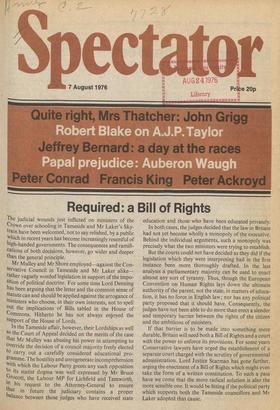Required: a Bill of Rights
The judicial wounds just inflicted on ministers of the Crown over schooling in Tameside and Mr Laker's Skytrain have been welcomed, not to say relished, by a public Which in recent years has become increasingly resentful of high-handed governments. The consequences and ramifications of both decisions, however, go wider and deeper than the general principle.
Mr Mulley and Mr Shore employed—against the Conservative Council in Tameside and Mr Laker alike_ rather vaguely worded legislation in support of the imposition of political doctrine. For some time Lord Denning has been arguing that the letter and the common sense of statute can and should be applied against the arrogance of ministers who choose, in their own interests, not to spell out the implications of Bills tabled in the House of Commons. Hitherto he has not always enjoyed the support of the House of Lords.
In the Tameside affair, however, their Lordships as well as the Court of Appeal decided on the merits of the case that Mr Mulley was abusing his power in attempting to override the decision of a council majority freely elected to carry out a carefully considered educational programme. The hostility and unregenerate incomprehension With which the Labour Party greets any such opposition to its statist dogma was well expressed by Mr Bruce Grocott, the Labour MP for Lichfield and Tamworth, m his request to the Attorney-General to ensure that in future the judiciary contains a proper balance between those judges who have received state education and those who have been educated privately.
In both cases, the judges decided that the law in Britain had not yet become wholly a monopoly of the executive. Behind the individual arguments, such a monopoly was precisely what the two ministers were trying to establish.
But the courts could not have decided as they did if the legislation which they were interpreting had in the first instance been more thoroughly drafted. In the last analysis a parliamentary majority can be used to enact almost any sort of tyranny. Thus, though the European Convention on Human Rights lays down the ultimate authority of the parent, not the state, in matters of education, it has no force in English law; nor has any political party proposed that it should have Consequently, the judges have not been able to do more than erect a slender and temporary barrier between the rights of the citizen and the ambitions of ministers.
If that barrier is to be made into something more durable, Britain will need both a Bill of Rights and a court with the power to enforce its provisions. For some years Conservative lawyers have urged the establishment of a separate court charged with the scrutiny of governmental administration. Lord Justice Scarman has gone further, urging the enactment of a Bill of Rights which might even take the form of a written constitution. To such a pass have we come that the more radical solution is also the more sensible one. It would be fitting if the political party which supports both the Tameside councillors and Mr Laker adopted that cause.


























